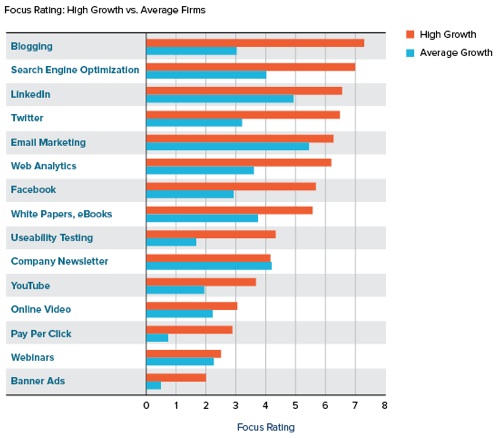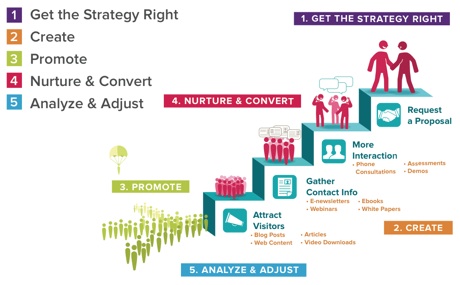
Many firms struggle with online marketing and wonder why they are not driving in as much business as competitors. In most cases, these firms are missing a key component of on online strategy: content marketing. Without compelling content to attract qualified prospects, an online marketing program will lose its way.
Content, first and foremost, should educate your readers. This content can be distributed through multiple channels, such as blog posts, webinars, guides, ebooks, and research studies. As people consume this content, they come to trust your firm and think of you as experts and thought leaders.
But to get the most out of your content you have to manage the time you spend creating and planning it with the resources you have. And the only way to make this happen is to develop a content marketing plan. But what does a content marketing strategy look like? And how do you ensure its return on investment?
This figure illustrates a content marketing model from beginning to end. It consists of 5 steps:
- Decide what kind of content you want to produce. This means first knowing your readers (your target audience) and determining the best ways to reach and educate them. What topics would benefit your readers most? And if you are familiar with search engine optimization, what keywords are you trying to rank for?
- Create content across multiple channels. If you are implementing a content strategy for the first time, start with a blog. Plan to produce educational, easy-to-read articles that are action-oriented and engaging. Next you may want to consolidate some of these posts into longer guides that address a topic of interest to your audience. Webinars are another great channel to educate and engage audiences who are interested in your services, but who may not be quite ready to buy. You’ll want to require registration for your longer-format content, such as guides and ebooks. But more on this in a moment.
- Now it’s time to promote. Promoting your content is critical to your content marketing strategy. Share your blog posts on social media, such as Twitter, LinkedIn and Facebook. Do the same for longer content, but also promote this type of content within your blog posts. This way, you entice your blog readers to exchange their email address for valuable, relevant content. This is a proven way to generate high-quality new leads.
- Nurture leads through your content. Once your readers have supplied their email address, you can continue to educate and nurture them. How do you do this? Think about what might interest prospects who are in the early stages of the buying process. Webinars, for instance, are a great way to step prospects up the engagement ladder, as you can interact with them in a more personal way (they can hear your voice and perhaps see your face) without any pressure to buy.
- Analyze and adjust your strategy along the way. What changes need to be made? Is your content drawing people to your website? Are you receiving email addresses in exchange for downloadable content? And are you growing your email list? Look at the numbers and if the answers are no, it’s time to revisit your approach.
Take a look at the figure below. High growth firms focus on blogging more than 2X as much as average growth firms. Similarly, high growth firms focus on whitepapers and ebooks much more than average growth firms (with a focus rating of just under 4 versus 5.5).




